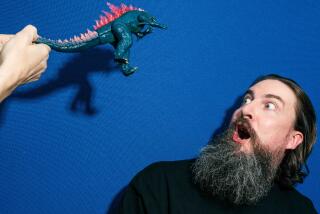Who’s the monster?
- Share via
Seoul — SOUTH KOREAN director Bong Joon-ho says he had wanted to make a monster movie since he was in high school, daydreaming of a creature emerging from the muddy Han River that flows through the center of Seoul. “I lived near the river and this idea remained in my head throughout the years,” says the director, now 37. So after making two features on the usual subjects -- relationships and murder -- he wrote and directed a spooky, comedic thriller called “The Host,” a monster of a movie that has smashed box office records in South Korea, selling 13 million tickets in a country of 49 million since its July release.
American audiences will get a look at what grabbed the Koreans when “The Host” screens Friday and Saturday at the ArcLight Theatre as part of AFI Fest, then comes to U.S. theaters later this year. They may squirm a bit too.
Bong based his movie on the true story of a 2000 scandal in which Albert McFarland, an American civilian running the morgue at the U.S. military base in Seoul, ordered Korean employees to dump embalming waste down a drain. The fluid was chemically treated but still ended up in the Han River. McFarland ended up in the headlines and a Korean court, where he was given a two-year suspended sentence.
The filmmaker immediately saw the incident’s potential. “When I heard of the McFarland case I knew it was perfect for the starting point of my story, so I welcomed the news,” he says.
Korean critics loved the mix of frights and humor. But the film will land in the United States at a highly charged moment, when most Americans absorbing news of the nuclear crisis from the Korean peninsula expect to see North Koreans, not themselves, cast as the bad guy.
Bong’s film is a reminder that in South Korea -- a country once intensely pro-American -- many younger countrymen and women now regard Washington as the obstacle to peace. “The Host” takes plenty of shots at the American military, which is not only responsible for creating the monster through criminal negligence but also proceeds to interfere in Korean government decisions. (At one point, the Americans spread phony rumors of a virus. “My satirical take on the absence of WMD in Iraq,” Bong says.)
“The Host” takes just 14 minutes to show us the truck-sized, flesh-hungry lizard Bong imagined. The acrobatic creature swings to life, wreaking havoc over the city and one dysfunctional Korean family in particular.
Speaking on the eve of his travels to the AFI Fest, Bong said he believed American audiences would respond to the plight of a family grappling with demons -- the slimy one as well as their own.
“The movie makes many comments on the U.S. presence in Korea, but I think U.S. audiences will actually enjoy it,” he said. “After all, my movie is just entertainment, fun. It’s about a monster. And the political message is very soft, especially compared to your own movies like ‘Fahrenheit 9/11.’ Americans who have seen that will not be shocked at my movie.”
That said, movies like “Fahrenheit 9/11” take aim at the Bush administration and while some Americans have no problem seeing politicians criticized, they may bristle at anything that negatively portrays the soldiers carrying out policy. (In “The Host,” it isn’t the politicians who cause the problem. The soldiers do, the ones supposedly defending the freedom of South Koreans.)
“There are two aspects to the U.S. soldiers stationed in Korea and other countries,” Bong explained. “They come with the sensibility that ‘We are defending your country.’ But there are side effects from this presence. The good and the bad coexist, and the McFarland case is a typical representation of the bad.
“But there are positive depictions of Americans in my movie too,” he added. “There is a kind and brave American soldier who tries to help Korean families.”
Bong acknowledged that it was a bit of a switch-up -- Americans as the villains rather than, say, North Koreans.
“North Koreans still exist as villains, but evil North Korean characters have existed in our movies and television miniseries for 50 years,” he said. “In the last few years, our movies have had more good portrayals of North Koreans. But movie villains continually change.”
Asia produces a steady stream of horror films, many of which are remade for U.S. audiences. So finding a new way to scare moviegoers who have seen just about everything is always a bit of a challenge. That’s why, Bong said, he tried to take the movie in a different direction.
“ ‘The Host’ is unlike previous Asian horror films. The general layout is the same: There is a scary monster. It has scenes that raise thrills and suspense. But the main focus of ‘The Host’ lies with the story of an extremely ordinary family, a bit cowardly at times, composed of what most people would regard as ‘losers’ in society.
“I think American audiences will like this Korean family -- their ordinary character, their powerless reality. It will move peoples’ hearts, whatever their nationality.”
More to Read
Only good movies
Get the Indie Focus newsletter, Mark Olsen's weekly guide to the world of cinema.
You may occasionally receive promotional content from the Los Angeles Times.









